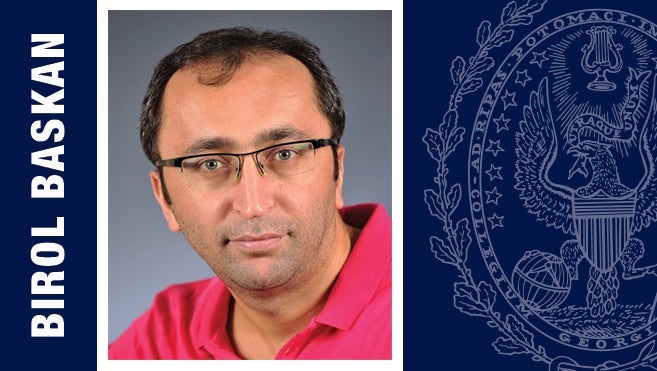Georgetown Qatar Professor Publishes New Book on Political History

An important scholarly contribution to the study of religion and politics has been made by Dr. Birol Baskan with the recent publication of his book “From Religious Empires to Secular States: State Secularization in Turkey, Iran, and Russia”, where he provides an in-depth comparative historical analysis of the diverging paths to state secularization in the 1920s and 1930s for the three title countries. Describing each state’s strategy as accommodationism in Turkey, separationism in Iran and eradicationism in Russia, the author goes on to explore what secularization is, and why states take different paths to this type of political reform.
“What does it mean to say that a state is secular, not religious? What might be the possible paths out of religious states into secular ones? These are the two questions that I aim to address in this book,” begins Dr.Baskan in his new book.
He defines “state secularization” as “unqualified declaration and unhindered application of sovereignty over all matters of public and private,” and critiques the limitations of previous theories that tend to focus on secularization as an extension of a particular ideology, such as liberal democracy, saying instead that secularization is more a reflection of the relationship between state and religious institutions and individuals. “For example, the state can still be secular even if it owns thousands of religious institutions, employs religious figures and even intervenes in the interpretation of religion as it has been the case in Republican Turkey.”
Focusing on the changing relations between the state and religious institutions, Baskan compares the very different strategies each took in shifting to a secular state:
“…rulers in Turkey adopted accommodationism. They closed down some religious institutions, but incorporated some others into the state body…those in Iran adopted separationism. Even though religious community/institutions lost many of their previous privileges as a result…they continued to operate…but had to depend on their own organizational and financial resources…State rulers in Russia, on the other hand, adopted eradicationism. They not only secularized the state, but also waged a brutal and hostile campaign against religion and religious community, closing down religious institutions, plundering their wealth, and propagating atheism to eradicate religion in the hearts and minds.”
He then concludes by bringing together a host of historical factors to account for the different approaches to transition, demonstrating that each strategy is in response to the particular situation each governmental found themselves in, rather than due to any particular ideology. “If the reformers came to power through an intense intra-elite competition and faced an acquiescent religious community, accommodationism was the outcome. If the reformers came to power through a palace coup and faced a disengaged religious community, separationism was the outcome. If the reformers came to power through a civil war and faced a confrontational religious community, eradicationism was the outcome.”
“This book is an important contribution to our understanding of the complex political dynamics that characterize the choices and evolution of different political systems in relation to religion. Dr. Baskan’s meticulous historical comparison is of direct relevance for 21st-century politics: many of the same questions still apply in much of the world, and in the countries studied the story he examines still reverberates today,” said GU-Q dean Dr. Gerd Nonneman. Birol Baskan is an assistant professor of government at GU-Q, and holds a PhD in political science from Northwestern University (USA). His research looks at state-regime-religion relations in the Middle East.